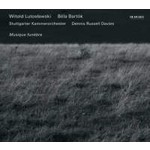
Musique funebre (with works by Bartok)
 $40.00
Low Stock
add to cart
$40.00
Low Stock
add to cart
LUTOSLAWSKI
Musique funebre (with works by Bartok)
Stuttgarter Kammerorchester, Dennis Russell Davies
[ ECM Records / CD ]
Release Date: Friday 1 June 2012
Should this item be out of stock at the time of your order, we would expect to be able to supply it to you within 2 - 5 business days.
"Russell Davies gives both pieces with the intensity they demand, the sound of the Stuttgart Kammerorchester warm and heard in a generously resonant acoustic."
(Sunday Times)
"Bringing together three Bartók suites with the funeral music composed in his memory by his admirer Witold Lutoslawski, Dennis Russell Davies here offers convincing confirmation of the former's influence on the latter. The "Romanian Folk Dances" are by turns impishly ebullient and wistfully nostalgic"
(The Independent)
"Russell Davies gives both pieces with the intensity they demand, the sound of the Stuttgart Kammerorchester warm and heard in a generously resonant acoustic."
(Sunday Times)
Dennis Russell Davies has had a long-running and highly productive association with the Stuttgart Chamber Orchestra - documented on exceptional ECM recordings of repertoire from Mozart via Stravinsky and Pärt to Kancheli - and is currently the orchestra's Conductor Laureate. Here he leads them through spirited performances of Bartók's Divertimento, the ever popular Romanian Folk Dances, and Seven Songs (for which the orchestra is joined by the Hungarian Radio Children's Choir).
This selection of lively Bartók pieces is viewed through the prism of Witold Lutoslawski's Musique funèbre, written in memory of the great Hungarian composer, and first performed on the 10th anniversary of Bartók's death. It's an important, and moving, piece - and one which also led to international recognition for Lutoslawski, Bartók's Polish kindred spirit.
The Divertimento for strings was Bartók's last composition in Europe before emigrating to the US. It adapts Hungarian local colour in a manner that documents his despondency and can still cause shivers in listeners today. He was probably aware that with this work in 1939 he was not only taking leave of Europe and his traditions. He must also have sensed that Europe as he knew it was about to disappear into the darkness of history.
The least known works here are undoubtedly the Seven Songs, taken from a collection of 27 by Bartók. These choruses on folk texts were created for Kodály's educational programme. Like the Romanian Folk Dances of 1915 (which were orchestrated a couple of years later), they are not folksong arrangements but rather original compositions "in the style of folk music". Wolfgang Sandner comments in his booklet notes: "They reveal a personality trait that one rarely comes across to such an extent in his other compositions: serenity; one is tempted to call it a sunny disposition, not clouded by social adversity. "Hey, life, glorious life, / This is the life, the glorious life!" are the last lines of the wooing song Csujogató, and that is how Bartók's original music sounds: joyous, beautiful and pure."
Tracks:
Bartok:
Romanian Folk Dances for orchestra, Sz. 68, BB 76
Divertimento for Strings, Sz. 113
Songs (from 27 Two- and Three-Part Choruses, BB 111)
Lutoslawski:
Musique Funébre